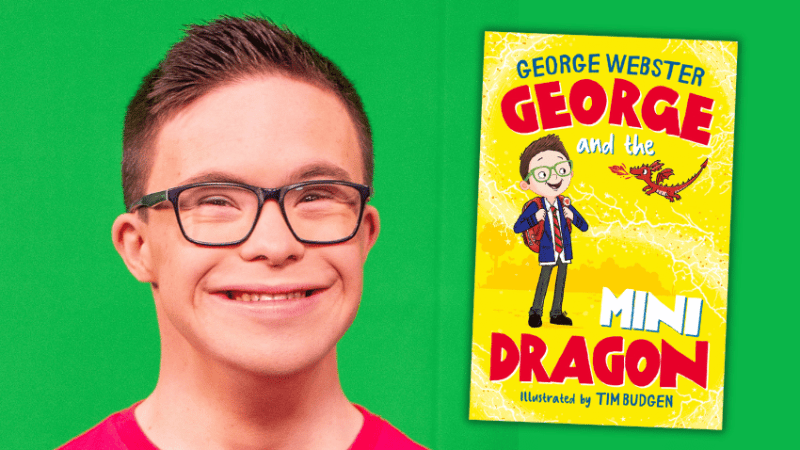SPaG games – Best offline and online ideas for schools
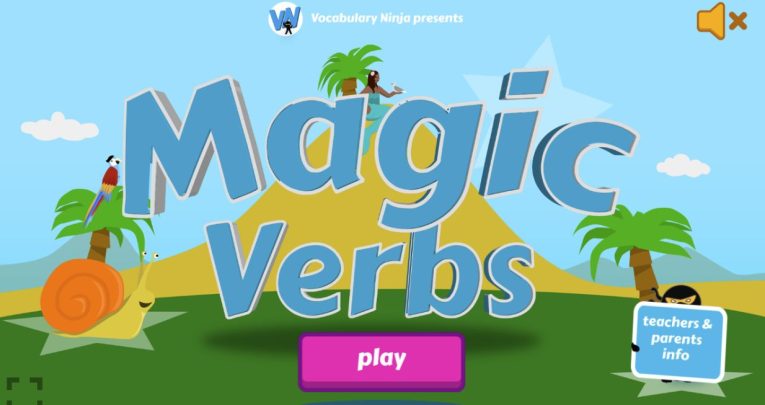
Stop! Grammar time. Give kids a fun way to consolidate learning with some interactive activities to test their SPaG skills…

- by Teachwire
- Classroom expertise and free resources for teachers
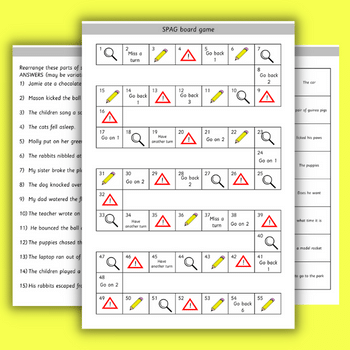
Want to know some of the best SPaG games this side of Countdown, Boggle and Scrabble? Get students’ spelling, grammar and punctuation skills up to scratch with these lighthearted yet educational SPaG games. It’s better than the language they’ll pick up playing Call of Duty online at home!
Don’t forget that as well as SPaG games, we also have round-ups of the best:
- Spelling games
- Punctuation games
- KS1 maths games, KS2 maths games and algebra games
- KS3 English games
Offline SPaG games
Punctuation game resources
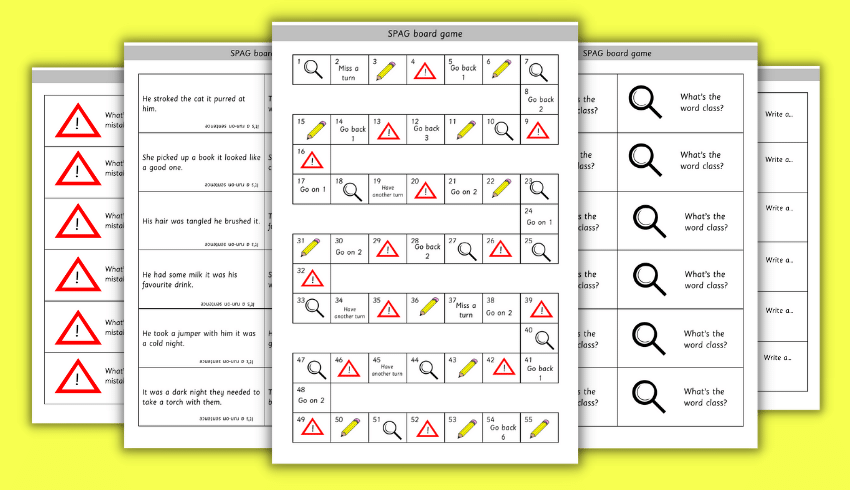
This free punctuation games download contains everything you need to play a sentence matching game for KS1 and a SPaG board game for KS2.
More grammar games
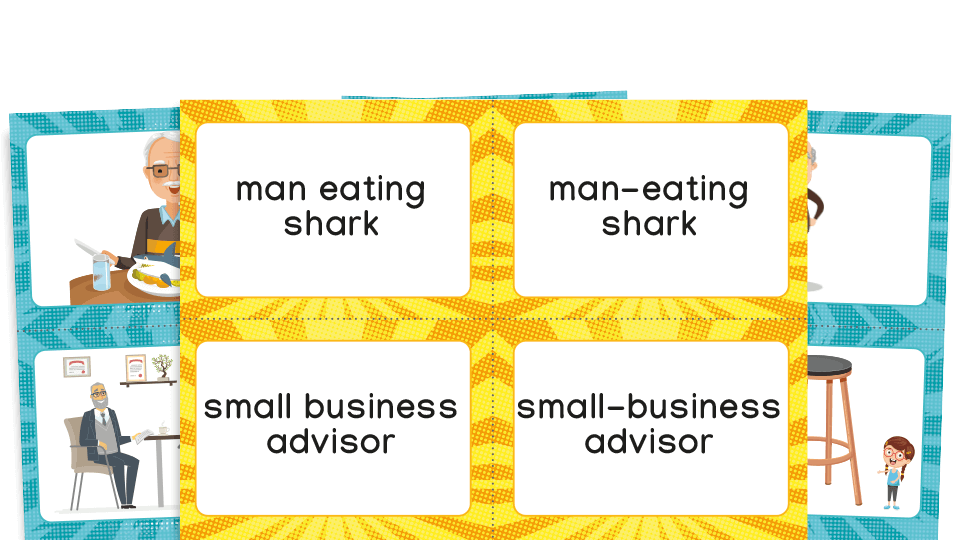
This collection of grammar games from our friends at literacy resource website Plazoom covers everything from sentence types to prepositions, homophones, prefixes, suffixes and more. Better yet, they’re all sorted by year group.
Fronted adverbials game
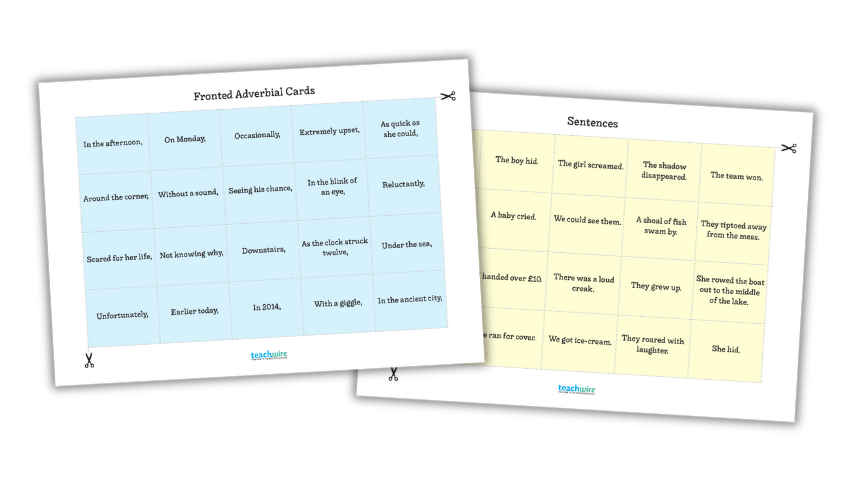
Play a variety of KS2 fronted adverbials games with this simple PDF resource. We’ve got instructions for four different games to play.
Phase 4 phonics games
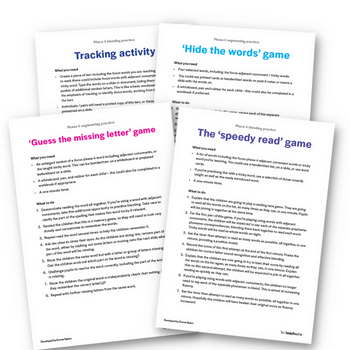
Use these phase 4 phonics games to help your pupils master blending and segmenting words. There are instructions for a speedy reading game, a tracking game, hide the words and guess the missing letter.
KS2 spelling games
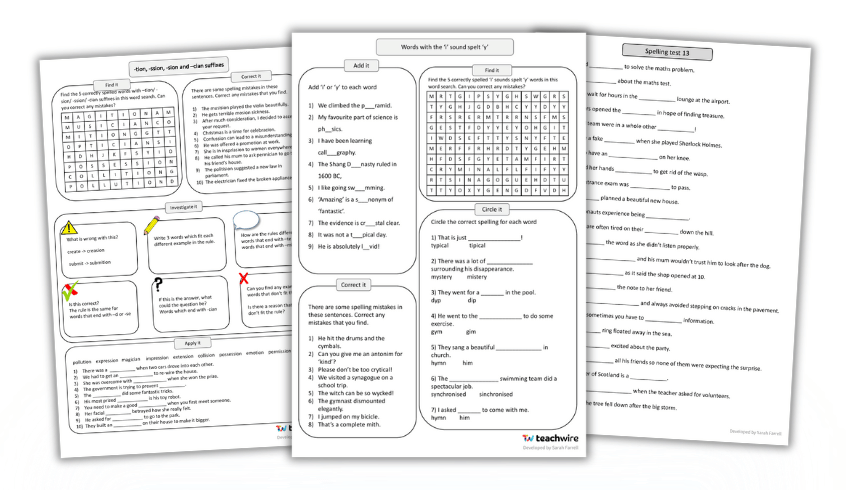
Explore suffixes and prefixes with this extensive pack of ready-made spelling games and worksheets, including activities such as ‘spot the spelling mistake’.
Punctuation bingo
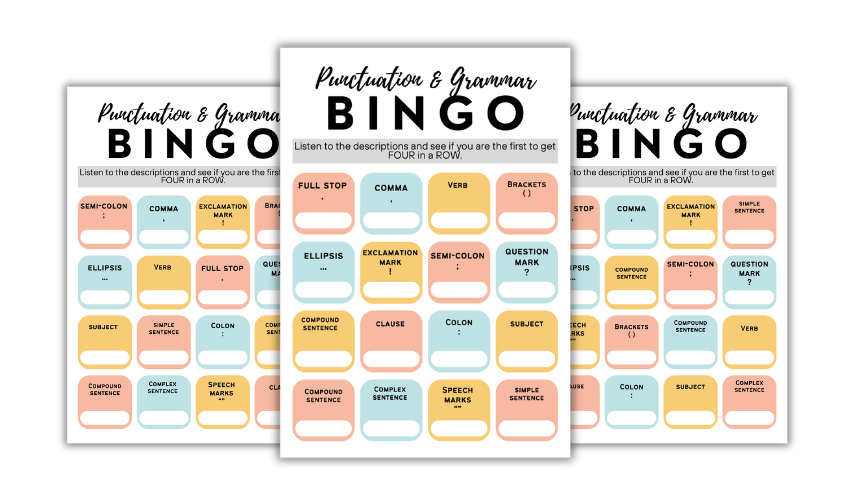
Write questions that correspond to the punctuation marks and grammar terms on these free bingo sheets. Students need to get four in a row: horizontally, vertically or diagonally, to win.
Example questions
- What piece of punctuation is used at the end of a sentence? (Full stop)
- What type of word describes an action? (Verb)
- Which piece of punctuation can replace a conjunction? (Semi-colon)
Word class tennis
Sit children in pairs facing each other. Call out a word class, eg ‘verb’. Pupils take turns to say a verb without long pauses or repeating one that has already been said.
Extend this idea by giving specific instructions such as regular past tense verbs, nouns beginning with a specific letter or adjectives to describe a specific subject.
Guess who?
Give out a grid of different creatures, in a similar format to the game ‘Guess Who?’. Use one theme for all of the pictures, eg dragons.
Ask the children to play in pairs. They need to select an image and try to guess their opponent’s one by asking yes/no questions using expanded noun phrases.
For example, is it a bright red dragon? Is it a dragon with spikes on its head? Once the children have guessed who their opponent’s character is, they can begin to construct some expanded noun phrases about the other characters in the grid.
Double trouble
Ask children to sit in pairs and distribute the same image to each child (a butterfly or tree, for example). Give pupils two minutes to write down as many adjectives to describe the image as possible.
At the end of the two minutes, children should take it in turns to call out an adjective. If their opponent also has that word, both players need to cross out the adjective. Continue until both children are left with words that their opponent doesn’t have.
How, where and when?
Share an image, such as Harry Potter flying on a broomstick, and ask the children to write a sentence on their whiteboards to explain what is happening, using a verb.
Next, shout either ‘manner’, ‘time’ or ‘place’. Pupils now need to come up with an ending for their sentence using an appropriate adverbial phrase, eg ‘with great care’, ‘just before his potions lesson’ or ‘over the Quidditch pitch’.
Write the ending
Provide children with the endings to colon sentences. Ask them what might have gone before the colon, eg ‘: the boat wasn’t big enough for six people’ might become ‘It was then that he delivered the dreadful news: the boat wasn’t big enough for six people.’
Give out a sheet of paper to each table, with colon sentence openings or endings written on it. Explain that the children need to work as a team and think of the missing information for each sentence.
Semicolon pairs
Give out an array of independent clauses which could be joined with a semicolon. Ask the children to get up and move around the classroom to find their partner.
Examples might include, ‘It was an incredibly hot day; our ice-creams melted within minutes’ or ‘The tiger escaped from the zoo; safety checks on the enclosures were poor’. Make a list of pairings and write them on the board with a semicolon between.
Begin at the end
Ask pupils to sit in pairs. Give the children a noun type, eg ‘common’. The first child needs to think of a common noun; the second child then responds with another common noun which begins with the final letter of the first word, eg ‘table’ followed by ‘egg’.
Children must not duplicate words. During this time, cruise the classroom to assess the children’s understanding and correct misconceptions.
Silly sentences
Before the lesson, prepare a set of cards per table featuring ten adverbs of frequency, 20 common nouns with articles (the dog, an apple, etc) and 20 verbs in the present tense.
Children must build sentences by randomly selecting cards from each pile and replacing them once they have been used. Each sentence must start with ‘I’.
There can be some hilarious outcomes, eg ‘I often paint the lion’, ‘I regularly walk the laptop’. Ask the children to record these in their books and then play again.
Rob Smith and Katherine Simpson are the creators of The Literacy Shed (@literacyshed). These games are adapted from 100 Ideas for Primary Teachers: Literacy (£14.99, Bloomsbury).
SPaG games that use dice
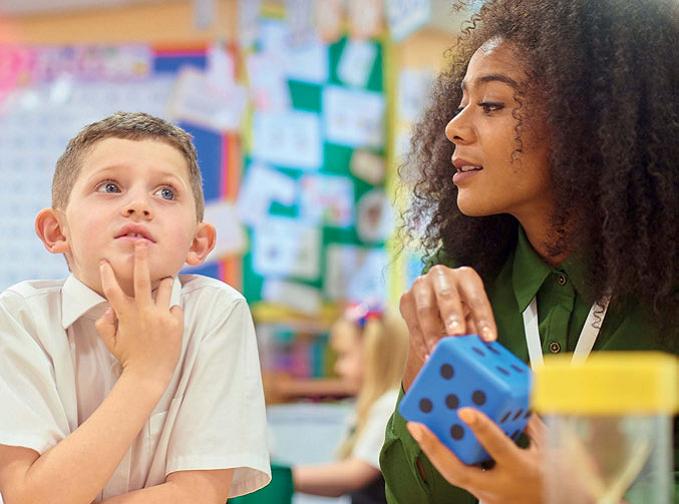
With these dice games, children will understand how changing a single preposition can make a powerful impact on the reader…
The real purpose of grammar is understanding how language can be manipulated to achieve different ends – in both comprehension and composition.
Dry, label-the-parts grammar lessons do not support this. Encouraging a playful, experimental – even risk-taking – attitude to language through SPaG games, however, gives children the chance to understand the impact of their choices, and those of others.
Help take the fear out of grammar and introduce a little magic through the element of surprise with these ideas…
Every Word Counts
To play Every Word Counts, create a six-word sentence, and attach a number to each word, in order:

First, consider the story: who might she be? Whose helicopter is it? Why is it plummeting?
With each throw of the dice, consider a range of alternative words that will work in the sentence and carefully examine how each alteration changes its meaning. Obviously, if we throw a 6 and change ‘helicopter’ to something like ‘dragon’, we have completely changed the genre. But notice too how even changes to words with a grammatical function can make an impact.
Look what might happen, for example, if we throw a 4:
- She leapt from a plummeting helicopter.
- She leapt from her plummeting helicopter.
- She leapt from that plummeting helicopter.
- She leapt from my plummeting helicopter.
Once children have experienced this, you can introduce the grammatical terminology beneath the sentence. The correct labels will be acquired, over time, while the focus stays on manipulating the meaning.

- pronoun
- verb
- preposition
- determiner
- adjective
- noun
So, if you throw a 3, say, “Change the preposition.” But always keep the emphasis on how meaning is affected while teaching the terminology.
Modifying the game
You may also modify the game in order to challenge children’s knowledge of terms. Create the sentence without numbering the words. Keep the numbers on the terminology list, but in the wrong order:
Trending
Then, I leapt onto the motorcycle.
- preposition
- noun
- adverb
- determiner
- pronoun
- verb
If you throw a 3, say, “Change the adverb.” To do this, children have to know which word is the adverb! Again, always keep the focus upon the story created by the vocabulary exchanges, as this is what grammar is for. Terminology is a secondary benefit.
Experiment with structure
This basic dice game can be modified to introduce varied sentence structures, for example, starting with a preposition:

- preposition
- determiner
- adjective
- noun
- pronoun
- verb
Or with an abstract noun:

- abstract noun
- verb
- preposition
- determiner
- adjective
- noun
This structure is a particular favourite of ours. Applied in composition, it conveys mood in a very immediate and concise way.
Notice how much impact you can achieve through swapping abstract nouns (eg peace, bliss, anticipation) or verbs (eg trickled, stalked, tiptoed).
To really emphasise how grammar choices influence meaning, you can use a sentence from a class story – one you are reading or composing together.

- pronoun
- verb
- preposition
- determiner
- adjective
- noun
With each change, consider what has happened. Changing the pronoun to ‘I’, ‘she’ or ‘they’ significantly alters the telling of the story. Changing the verb might affect the mood, eg ‘He bounded up the swaying beanstalk.’
Mood-Maker
Mood-Maker is a game that teaches children to make their language choices in pursuit of creating a particular atmosphere. Play can be based on any of the versions of Every Word Counts explained above, but you should use a deliberately bland starting sentence. Begin by generating six moods, attaching a number to each
- creepy
- joyful
- shocking
- sad
- funny
- exciting
An initial dice throw selects the mood that should be applied to every word choice that follows. For example:

- subject
- verb
- preposition
- determiner
- adjective
- noun (object)
Throwing a 1 means the mood is creepy. Throwing another 1 means you have to change she in a way that contributes to creepiness, eg it. Then, if you throw a 5, the adjective must also be creepy, eg haunted or derelict.
Thus, ‘She walked to the old building’ could become ‘It stalked towards their derelict cabin’
Make it more complex
A more complex version of the same game might look something like this:
He walked up the stairs.
Mood:
- creepy
- joyful
- shocking
- sad
- funny
- exciting
Grammar:
- Change the subject
- Change the verb
- Change the determiner
- Add an adverbial for when
- Add an adverbial for how
- Expand the noun phrase
Again the initial dice throw defines the mood. Subsequent throws direct the alterations and additions. Don’t feel you have to work through all six functions as this may lead to a clumsy sentence, which is the last thing we want.
Thus, ‘He walked up the stairs’ might become ‘The masked man leapt explosively up my attic stairs’.
Can you work out the mood defined by our first dice throw? If not, we need to work on our choices, and you may be able to suggest something better!
Christine Chen and Lindsay Pickton are primary education advisors (primaryeducationadvisors.co.uk) supporting English development nationally.
Online SPaG games
The Adjective Detective
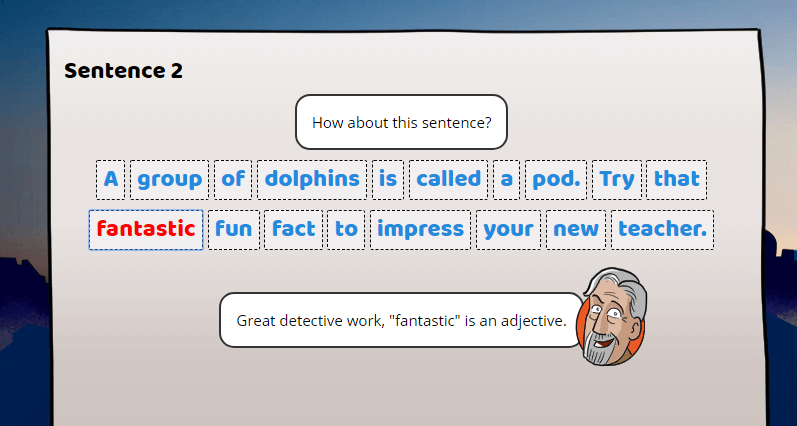
Probably not much use on actual criminal investigations (perhaps why he’s hosting online grammar games), the Adjective Detective helps kids spot, you guessed it, the adjectives in various sentences.
The Quest of Comma Castle
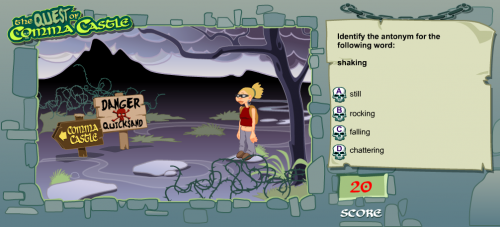
Looking for exciting online SPaG games that focus on punctuation? Who’d have thought the humble comma could be the difference between life and death?
Well, it is in The Quest of Comma Castle, where you need to save a diamond from the Plinth of the Perishing Pit, negotiating dragons, bottomless pits and other deadly obstacles, all by answering grammar questions.
There are four difficulty settings, and six sections to play through. Real heroes know their synonyms and antonyms.
Present simple and present continuous
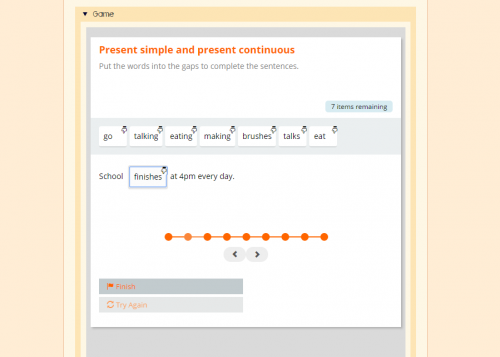
This present simple and present continuous game is just one of a hatful of grammar games from The British Council where you have to put the correct word into each sentence. Other topics covered include prepositions of place, modals and articles.
Spooky spellings
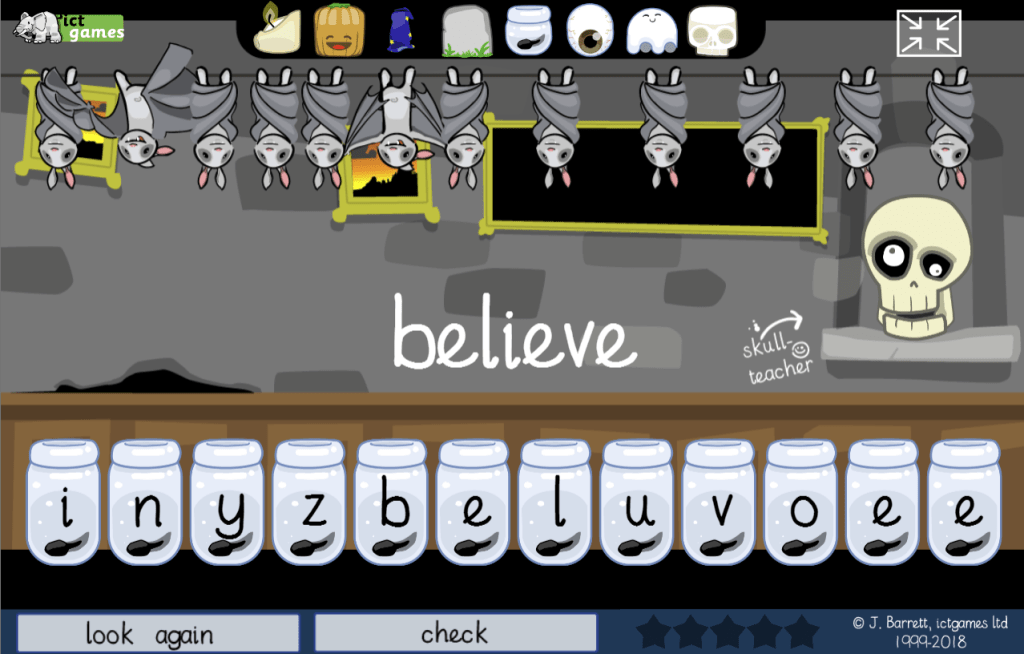
Practise spelling common exception words – also called tricky words – with this spooky spelling game. Select your year group (from Y1 to Y6) then arrange the letters in the right order to spell each word.
Naming nouns
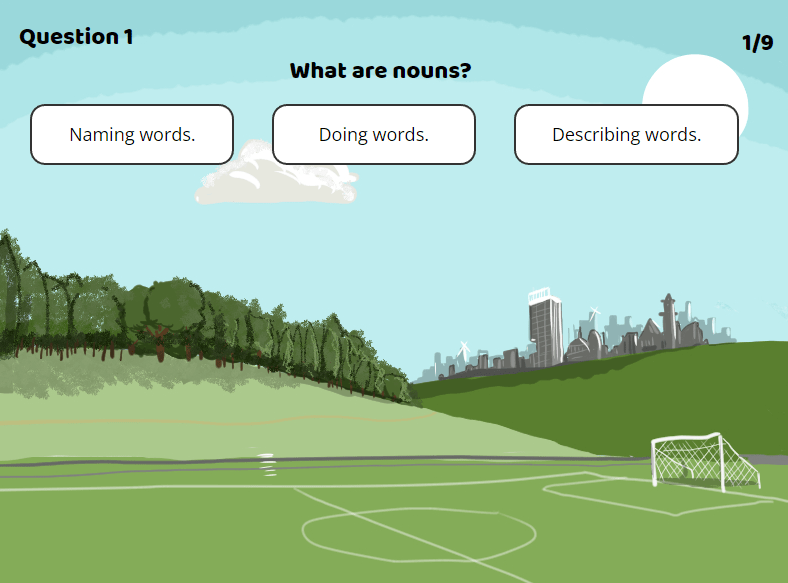
Learn all about what nouns are – including refreshers on common, proper, abstract, concrete, count, non-count and collective nouns – then take this football themed nouns quiz.
Word Frog

In this Word Frog game you need to move an amphibian around to strike the right word. You can theme the game around antonyms, synonyms or homophones, and there’s three game speeds.
Magic Verbs
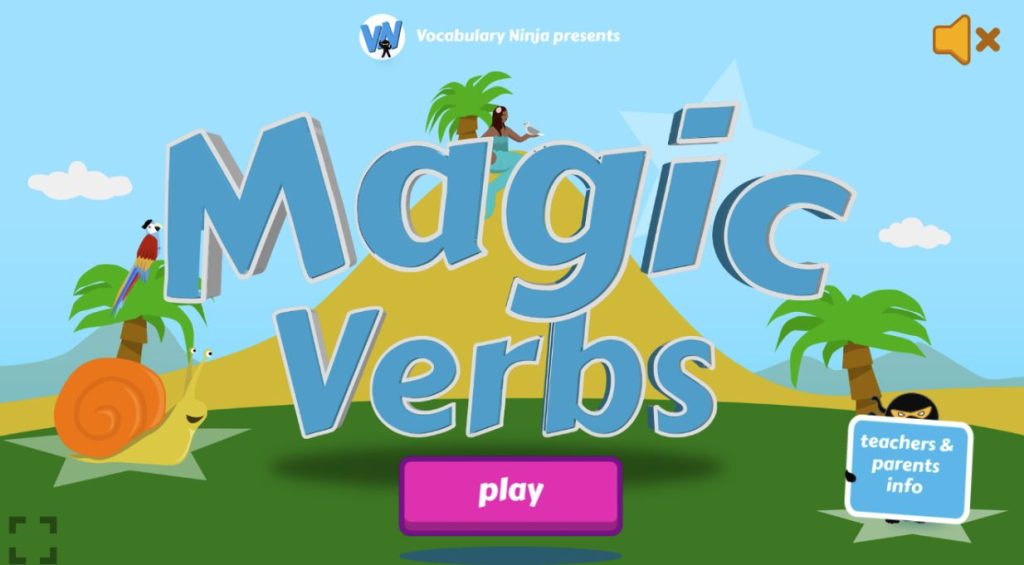
Magic Verbs demonstrates the importance of verbs in every sentence. Children have to change the atmosphere or mood of the text by choosing specific verbs – bringing the sentence to life.
Verb, noun or both?
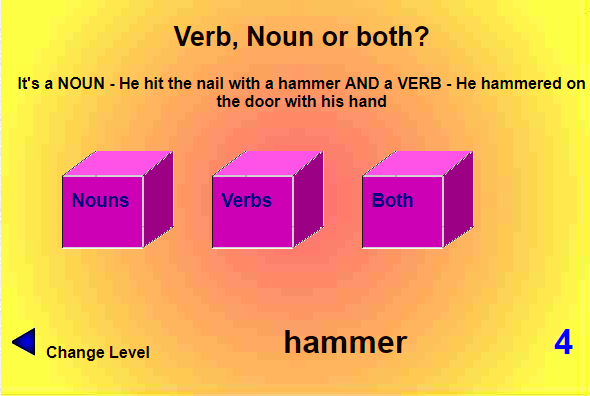
Not the flashiest-looking game you’ll ever play, but it does the job well for learning grammar. As you’ve probably guessed from the title, children are given words which they need to sort into one of three boxes depending on whether each one is a noun, verb or can be used as both.
This is great because even if they immediately recognise a word as being a noun or verb, they still need to stop to think if it could be used as the other too.
Browse Year 5 and 6 spelling list resources and free KS2 spelling worksheets.









